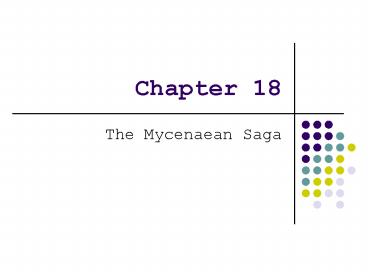The Mycenaean Saga - PowerPoint PPT Presentation
1 / 11
Title:
The Mycenaean Saga
Description:
It controlled much of mainland Greece through alliance, and much of the Greek islands too. ... What a family betrayal, intrigue, infidelity, cannibalism and incest! ... – PowerPoint PPT presentation
Number of Views:55
Avg rating:3.0/5.0
Title: The Mycenaean Saga
1
Chapter 18
- The Mycenaean Saga
2
Mycenae
- The major Greek city in the late Bronze Age
(1600-1100 BC). - It controlled much of mainland Greece through
alliance, and much of the Greek islands too. - Linear B oldest form of written Greek found in
Mycenae and Pylos.
3
Bloody Family History
- Tantalus Pelops
- Pelops Oenomaus
- Pelops Myrtilus
- Thyestes Atreus
- Atreus Thyestes
- Thyestes Pelopia
- Agamemnon Iphigenia
- Aegisthus Clytemnestra Agamemnon
- Orestes Clytemnestra Aegisthus
4
Tantalus Pelops
- How is it that a guy who dines with the gods
tries to pull this kind of stunt? - May allude to a time of human sacrifice
- Pindar denies it
5
Atreus Thyestes
- What a family betrayal, intrigue, infidelity,
cannibalism and incest! - If you eat at the House of Atreus, avoid any
items listed as Specialties of the House, or
boast a secret family recipe.
6
Agamemnon Iphigenia
- Again we have a sacrifice may point to a time
of human sacrifice no longer acceptable. - Lucretius On the Nature of Things an Epicurean
view on the dangers of religion
7
Clytemnestra Aegisthus
- Motivation is partially valid Aegisthus and
Clytemnestra are agents of the spirits of blood
vengeance (the Furies), but
8
Orestes
- Has a more valid case than Aegisthus
Clytemnestra doesnt have another agenda. - He is avenging his dad, and the king.
- Is pursued by the Furies, though.
- Will eventually be found not guilty.
- Orestes is not pursued by the Furies in all
versions (cf. Sophocles Electra).
9
Aeschylus Oresteia (458 BC)
- Our only surviving dramatic trilogy from ancient
Greece. - Agamemnon
- The Libation Bearers (Choephori)
- Eumenides
- Shows the arc of the blood vengeance from Atreus
through Orestes which is then supplanted by civic
justice (Orestes is finally acquitted in a trial
in Athens on the Areopagus)
10
Euripides Electra (c. 415 BC)
- Tells the story of Orestes return and his
killing of Aegisthus and Clytemnestra. - Is very reluctant to kill mother, bullied into it
by his sister - Emphasis is on the pathology of the house as
represented by Orestes and Electra - Also makes fun of Aeschylus archaic style and
logic.
11
Sophocles Electra (c. 410)
- Date unclear, but probably after Euripides.
- Covers same material, but emphasis is on the
heroic actions of Orestes and Electra settling
accounts with their fathers murderers. - No hint of guilt or madness.
- Play emphasizes the long suffering of Electra,
waiting for her brother. Sophocles Electra is
the hero(ine) who wont bend or submit.















![[PDF] DOWNLOAD The Forget-Me-Not Girl: A heartwarming family saga from the PowerPoint PPT Presentation](https://s3.amazonaws.com/images.powershow.com/10053126.th0.jpg?_=202406110611)
![[pdf] mutiny on the bounty: a saga of sex, sedition, mayhem PowerPoint PPT Presentation](https://s3.amazonaws.com/images.powershow.com/10141152.th0.jpg?_=20240927046)




![[PDF READ ONLINE] The Demon of Unrest: A Saga of Hubris, Heartbreak, and Heroism at the Da PowerPoint PPT Presentation](https://s3.amazonaws.com/images.powershow.com/10106299.th0.jpg?_=20240823111)
![[PDF READ ONLINE] The Demon of Unrest: A Saga of Hubris, Heartbreak, and Heroism at the Da PowerPoint PPT Presentation](https://s3.amazonaws.com/images.powershow.com/10106309.th0.jpg?_=20240823112)

![Read [PDF] The Demon of Unrest: A Saga of Hubris, Heartbreak, and Heroism at the Dawn of PowerPoint PPT Presentation](https://s3.amazonaws.com/images.powershow.com/10106297.th0.jpg?_=20240823111)
![Read [PDF] The Demon of Unrest: A Saga of Hubris, Heartbreak, and Heroism at the Dawn of PowerPoint PPT Presentation](https://s3.amazonaws.com/images.powershow.com/10106308.th0.jpg?_=20240823112)
![Download [PDF] The Demon of Unrest: A Saga of Hubris, Heartbreak, and Heroism at the Dawn PowerPoint PPT Presentation](https://s3.amazonaws.com/images.powershow.com/10106307.th0.jpg?_=20240823112)
![Download [PDF] The Demon of Unrest: A Saga of Hubris, Heartbreak, and Heroism at the Dawn PowerPoint PPT Presentation](https://s3.amazonaws.com/images.powershow.com/10106296.th0.jpg?_=20240823111)



